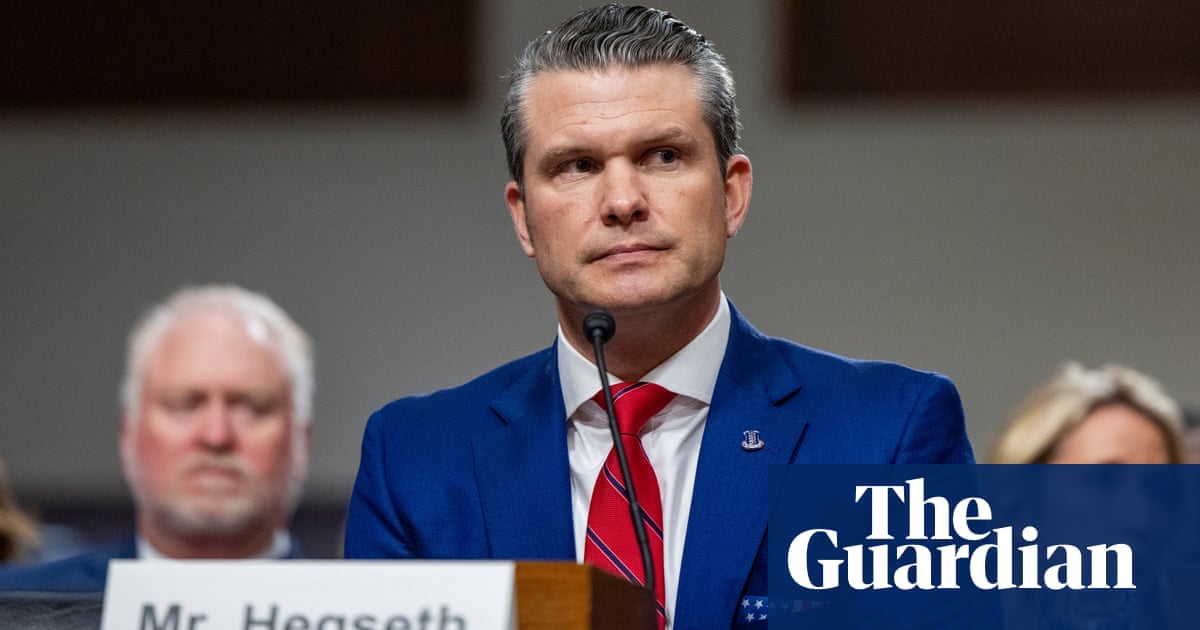In a series of newly unearthed podcasts, Pete Hegseth, Donald Trump’s pick for defense secretary, appears to endorse the theocratic and authoritarian doctrine of “sphere sovereignty”, a worldview derived from the extremist beliefs of Christian reconstructionism (CR) and espoused by churches aligned with far-right Idaho pastor Douglas Wilson.
In the recordings, Hegeth rails against “cultural Marxism”, feminism, “critical race theory”, and even democracy itself, which he says “our founders blatantly rejected as being completely dangerous”.
For much of the over five hours of recordings, which were published over February and March 2024, Hegseth also castigates public schools, which he characterizes as implementing an “egalitarian, dystopian LGBT nightmare”, and which podcast host Joshua Haymes describes as “one of Satan’s greatest tools for excising Christ from not just our classrooms but our country”.
Elsewhere in the recordings, Hegseth expresses agreement with the principle of sphere sovereignty, which, in CR doctrine, envisions a subordination of “civil government” to Old Testament law, capital punishment for infringements of that law such as homosexuality, and rigidly patriarchal families and churches.
Julie Ingersoll, a professor and director of religious studies at the University of North Florida who has written extensively about Christian reconstructionism and Christian nationalism, told the Guardian: “When these guys say they believe in the separation of church and state, they’re being duplicitous. They do believe in separate spheres for church and state, but also in a theocratic authority that sits above both.”
Hegseth’s far-right beliefs have garnered attention as his nomination to lead the world’s largest military has proceeded. The former elite US soldier and Fox News television star has also garnered negative attention over media reports on his allegedly excessive drinking and allegations of sexual assault.
On Hegseth’s probable assumption of a high-ranking cabinet position in the Trump administration, and how he might view his constitutional role, Ingersoll said: “These folks are not particularly committed to democracy. They’re committed to theocracy.”
She added: “If the democratic system brings that about, so be it. If a monarchy brings it about, that’s OK, too. And if a dictatorship does, that’s also OK. So their commitment is to theocracy: the government of civil society according to biblical law and biblical revelation.”
Logan Davis, a researcher, consultant and columnist from Colorado, grew up in a reformed Calvinist church similar to Pilgrim Hill Reformed Fellowship, which Hegseth now attends, and spent middle and high school in a classical Christian school affiliated to the one Hegseth’s children now attend.
In November he wrote a column entitled “Pete Hegseth and I know the same Christian Nationalists”.
Asked how Hegseth would understand his oath if sworn in as secretary of defense, Davis said: “Hegseth will be swearing to defend the constitution that he, to the extent he is aligned with Doug Wilson, does not believe includes the separation of church and state.”
Asked if Hegseth’s performance of his duties might be influenced by the belief that, as Wilson put it in a 2022 blogpost, “We want our nation to be a Christian nation because we want all the nations to be Christian nations”, Davis said: “I can tell you that the reformed leaders around him… are all sincerely hoping that that is how he will view his mandate.”
The Guardian contacted Hegseth with questions about his beliefs on the separation of church and state, and sphere sovereignty, but received no reply.
Podcast
The podcast series, recorded for Pilgrim Hill’s Reformation Red Pill show, was ostensibly a discussion of Hegseth’s 2022 book Battle for the American Mind, co-written with David Goodwin. The book claims to reveal a “progressive plan to neutralize the basis of our republic” via public schools, core curriculums, and even rituals such as the pledge of allegiance, all of which stretches back at least a century.
Hegseth’s co-author, David Goodwin, is also the serving president of the Association of Classical Christian Schools (ACCS), an organization founded in Moscow, Idaho, which promotes and certifies “classical Christian” schools, and is closely associated with Wilson, a pastor based in Moscow, Idaho, and a leading promoter of classical Christian education.
Both the John Edwards Classical Academy, which Hegseth’s children attend, and Franklin Classical School attended by Davis are affiliated with ACCS. Each is near Nashville, which Davis describes as “one of the cradles of the movement”, but Classical Christian Education has by now exploded nationwide. By his reckoning the number of schools affiliated to ACCS around the country has more than doubled in the last decade to 475.
The Guardian has reported extensively on how Wilson and the church he founded, Christ church, have sought to expand their influence in Moscow; how the church resisted Covid-19 public health mandates despite members pocketing government loans associated with the pandemic; and how figures associated with Christ church, including Wilson’s son, sought to expand their activities into the entertainment industry, including, apparently, mainstream children’s entertainment.

Wilson has also attracted broader criticism. Controversies have arisen from his apparent defense of slavery; his church’s handling of abuse accusations and the tolerance of convicted pedophiles in their ranks.
Wilson’s teachings include that “wives need to be led with a firm hand”, that “Christians do not set aside the death penalty for homosexual sin”, that “all the nations of man are to be brought into submission to Christ”, and that in a Christian nation, non-Christian religions would be banned from the public square.
In a discussion of sexuality, Wilson once wrote: “The sexual act cannot be made into an egalitarian pleasuring party”, adding: “A man penetrates, conquers, colonizes, plants. A woman receives, surrenders, accepts.”
Earlier this month, Right Wing Watch reported that Wilson outlined his Christian Nationalist objection to H1-B visas by saying: “That’s a lot of Hindus.”
In the first of the recorded episodes, Hegseth tells Haymes, the host, that writing the book with Goodwin led him to move his family to Tennessee so he could enroll them in a classical Christian school.
“The whole writing process was a red pill,” Hegseth says at one point, adding: “We moved to Tennessee to move to a classical Christian school because of this book. Because when I started writing it, we didn’t have all our kids in that form of education.”
Later, he adds: “We landed on one in middle Tennessee and we moved to it. We thought we were moving to a school, but we moved to a church and a community and a whole view of the world that has changed the way we think, too.”
The church, Pilgrim Hill Reformed Fellowship, is in Goodlettsville, Tennessee, the same community where Hegseth in 2022 acquired a more than 8,800 sq ft house standing on over 76 acres for some $3.4m, according to Sumner county property records, MLS records, and data brokers.
The church is, in turn, a member of the Congregation of Reformed Evangelical Churches (CREC), another organization co-founded by Douglas Wilson, which unites a growing number of churches around the country who subscribe to Wilson’s theological vision.
In the recordings, Haymes or Hegseth directly and favorably quote Wilson at least three times, with Haymes praising his criticism of the concept of white privilege, and sharing his criticism of the founders for “not making our country distinctly Christian in the [founding] documents”, and Hegseth reporting that he would read a book from a rightwing Catholic publisher at Wilson’s recommendation.
Ingersoll, the religion scholar, said Hegseth’s membership in the church and his children’s attendance at its associated classical Christian school indicate a close alignment with the views of Wilson and his movement. “He is in a CREC church and sends his kids to a classical Christian school. There’s no way you can do that and not agree with the theology,” she said.
“Their process of becoming a member of a church isn’t just showing up,” Ingersoll added. “You have to go before the board of elders, you get grilled on your theology and your conversion experience, and if the elders of the church agree to accept you as a church member, you have to sign a covenant submitting to the authority of the congregation and through the elders.”
“So if he didn’t agree with Wilson, he couldn’t be part of that church. They would kick him out,” she said.
Davis agrees, “CREC is very “covenant driven”, he said. “CREC has really taken it to a level of contractual relationships because they have a thing for authority.”
Throughout the podcasts, Hegseth repeatedly affirms aspects of CREC theology, including the crucial doctrine of sphere sovereignty, which sees all aspects of human life, including government, as being bound by a vision of biblical law that includes Old Testament precepts of morality and punishment.
In the first of the recordings with Hegseth, Haymes, who is also a pastoral intern at Pilgrim Hill, introduces “the doctrine of sphere sovereignty”, which he says prescribes “authorities that are outlined in God’s word, that are natural authorities that we must submit to as humans”.
Those authorities are “the state, the family, and the church”. In the church, he says, “we actually are supposed to submit to the authority of our elders”, such that “when we are in unrepentant sin, we can be put under church discipline”.
In the home, Haymes says, “the father has actual authority over his wife and children. And then the wife has authority over the children too, but ultimately it’s a patriarchal vision.”
“And then the state,” Haymes says, “… the tool that God has given the state is the sword.” The state’s role is “to praise the good and to protect the righteous from the wicked, but through primarily punishment, capital punishment and [other] punishments”.
“The state’s role is not to do good,” he says. “It’s not their responsibility to educate your children. It is the family’s responsibility. Helped along with the church.”
On this vision, all three spheres are bound to operate within the confines of biblical law where the Bible is understood as a unity, and in which Old Testament law – including proscriptions on homosexuality and adultery – is mostly still binding.
Ingersoll said that “when these guys talk about a biblical perspective, it’s all rooted in this idea”. She added: “The Bible applies to all areas of life, and the Bible from Genesis to Revelation is still relevant for today and for all culture.”
Ingersoll added: “The way they put that into practice is through this mechanism of sphere sovereignty.”
She said that while the original understanding of sphere sovereignty is rooted in the Reformation, and was further developed in the 19th century by the Dutch churchman and politician Abraham Kuyper, the version in circulation in churches influenced by Wilson descends directly from the theocratic Christian reconstructionism of Armenian American minister RJ Rushdoony, whose writings throughout the latter half of the 20th century informed Christian homeschooling and dominionist Christianity alike.
“Rushdoony’s version is the one Wilson adopted,” Ingersoll said.
Davis says that “the most troubling ways I’ve seen Sphere Sovereignty teachings manifest are in things that were handled entirely through church discipline without other authorities being made aware of what was happening”, citing the example of a classmate who had been subject to sexual abuse in their family.
“That was handled entirely via church discipline and no police were ever informed,.” he said.
For Wilson and those influenced by him, “the civil government isn’t supposed to be running schools. The role of the state is to punish evildoers,” Ingersoll said. “And they don’t really believe in incarceration, because the evil that they would punish would be mostly things that they would punish with the death penalty.”
In his contributions on the podcast, Hegseth repeatedly outlines what he appears to see as the fundamental illegitimacy of public education, which he sees as little more than a conduit for a “culturally Marxist” worldview.
In the last of the four recordings, Hegseth puts a particularly dramatic spin on the danger he says that public education poses to Christian children and their parents.
Towards the end of the recording, Hegseth tells Haymes: “I mean, we are in the kill zone currently. He adds: “The phrase we use in the military is ‘the X’. If you’re standing on the X in an ambush, you’re dead. That means the enemy’s guns are pointed at you.”
“We are all on the X right now,” Hegseth continues. “Our kids are on the X in government schools.”
“They are being accosted and assaulted on a daily basis with evil ideologies that are corrupting their mind, that are corrupting their affections and leaving them incapable of seeking the kind of wisdom that’s required.”
The response he suggests is a kind of “insurgency” or “guerrilla war”.
“I’ve written battlefield assessments my whole life,” Hegseth says during the same episode. “And then as I started thinking about it, I’m like, wow, this is where we’re insurgents.”
Amplifying the theme, Hegseth says: “I was a senior counter-insurgency instructor in Afghanistan. So my job was to train troops coming in, mostly American, but coalition, sometimes Afghan, give them a sense of the Taliban’s capabilities and al-Qaida.”
He suggests that those wanting to carry out an insurgency against public education should imitate the tactics of the Taliban.
“Delegitimizing your enemy is a huge part of insurgency,” Hegseth says. “To use the Afghanistan example, that’s what the Taliban did for two decades. ‘You think the Afghan government represents you? They’re just puppets of the Americans. They’re more corrupt than we are.’”
Continuing to paraphrase theocratic insurgents, Hegseth says: “‘At least we execute justice. You may not like us, but when you come to court, we’ll solve your problem in 30 minutes, and you’ll have a ruling based on the Qur’an that you say you believe in.’”
To delegitimize public schools, Hegseth suggests opponents could argue that “first of all, these schools fail everybody. No one learns anything in them.”
He continues: “And second of all, they’re indoctrination camps. They’re transing your kids.”
In another concrete suggestion, Hegseth says that “part of what we call for, too, is cameras in the classroom”.
“Why can’t I see what’s going on there?” he asks. “That’s common sense.”

 German (DE)
German (DE)  English (US)
English (US)  Spanish (ES)
Spanish (ES)  French (FR)
French (FR)  Hindi (IN)
Hindi (IN)  Italian (IT)
Italian (IT)  Russian (RU)
Russian (RU)  9 hours ago
9 hours ago
























Comments